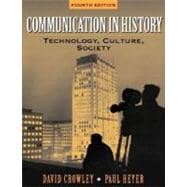
Note: Supplemental materials are not guaranteed with Rental or Used book purchases.
Purchase Benefits
What is included with this book?
I. THE MEDIA OF EARLY CIVILIZATION.
1. The Art and Symbols of Ice Age Man, Alexander Marshack.
2. The Evolution of Symbols in Prehistory, Denise Schmandt-Besserat.
3. The New Rosetta Stone, Richard Rudgley.
4. Media in Ancient Empires, Harold Innis.
5. Civilizations without Writing—the Incas and the Quipu, Marcia Ascher and Robert Ascher.
6. The Origins of Writing, Andrew Robinson.
II. THE TRADITION OF WESTERN LITERACY.
7. The Alphabet, Johanna Drucker.
8. The Greek Legacy, Eric Havelock.
9. Writing and the Alphabetic Effect, Robert K. Logan.
10. Orality, Literacy, and Modern Media, Walter Ong.
11. A Medieval Library, Umberto Eco.
12. Communication in the Middle Ages, James Burke.
III. THE PRINT REVOLUTION.
13. Paper and Block Printing—From China to Europe, T. F. Carter.
14. The Invention of Printing, Lewis Mumford.
15. The Rise of the Reading Public, Elizabeth Eisenstein.
16. Early Modern Literacies, Harvey J. Graff.
17. The Trade in News, John B. Thompson.
18. Files, Bureaucrats, and Intellectuals, Robert Darnton.
IV. ELECTRICITY CREATES THE WIRED WORLD.
19. The Optical Telegraph, Daniel Headrick.
20. Telegraphy—The Victorian Internet, Tom Standage.
21. The New Journalism, Michael Schudson.
22. The Telephone Takes Command, Claude S. Fischer.
23. Inventing the Expert, Carolyn Marvin.
24. Time, Space, and the Telegraph, James Carey.
V. IMAGE TECHNOLOGIES AND THE EMERGENCE OF MASS SOCIETY.
25. On Photography, Susan Sontag.
26. Early Photojournalism, Ulrich Keller.
27. Dream Worlds of Consumption, Rosalyn Williams.
28. Early Motion Pictures, Daniel Czitrom.
29. Mass Media and the Star System, Jib Fowles.
30. Advertising and the Idea of Mass Society, Jackson Lears.
VI. RADIO DAYS.
31. Wireless World, Stephen Kern.
32. Early Radio, Susan J. Douglas.
33. Movies Talk, Scott Eyman.
34. The Golden Age of Programming, Christopher Sterling and John M. Kittross.
35. Radio and Race, Gerald Nachman.
36. Understanding Radio, Marshall McLuhan.
VII. TV TIMES.
37. Television Begins, William Boddy.
38. The New Languages, Edmund Carpenter.
39. Making Room for TV, Lynn Spigel.
40. The Sixties Counterculture on TV, Aniko Bodroghkozy.
41. Television Transforms the News, Mitchell Stephens.
42. Two Cultures—Television versus Print, Neil Postman and Camille Paglia.
VIII. NEW MEDIA AND OLD IN THE INFORMATION AGE.
43. The Control Revolution, James Beniger.
44. How Media Became New, Lev Manovich.
45. The Hypermedia Environment, Ronald J. Deibert.
46. Popularizing the Internet, Janet Abbate.
47. From Codex to Homepage, James J. O'Donnell.
48. A World Wide Web, Jay David Bolter and Richard Grusin.
Suggested Readings.
The New copy of this book will include any supplemental materials advertised. Please check the title of the book to determine if it should include any access cards, study guides, lab manuals, CDs, etc.
The Used, Rental and eBook copies of this book are not guaranteed to include any supplemental materials. Typically, only the book itself is included. This is true even if the title states it includes any access cards, study guides, lab manuals, CDs, etc.